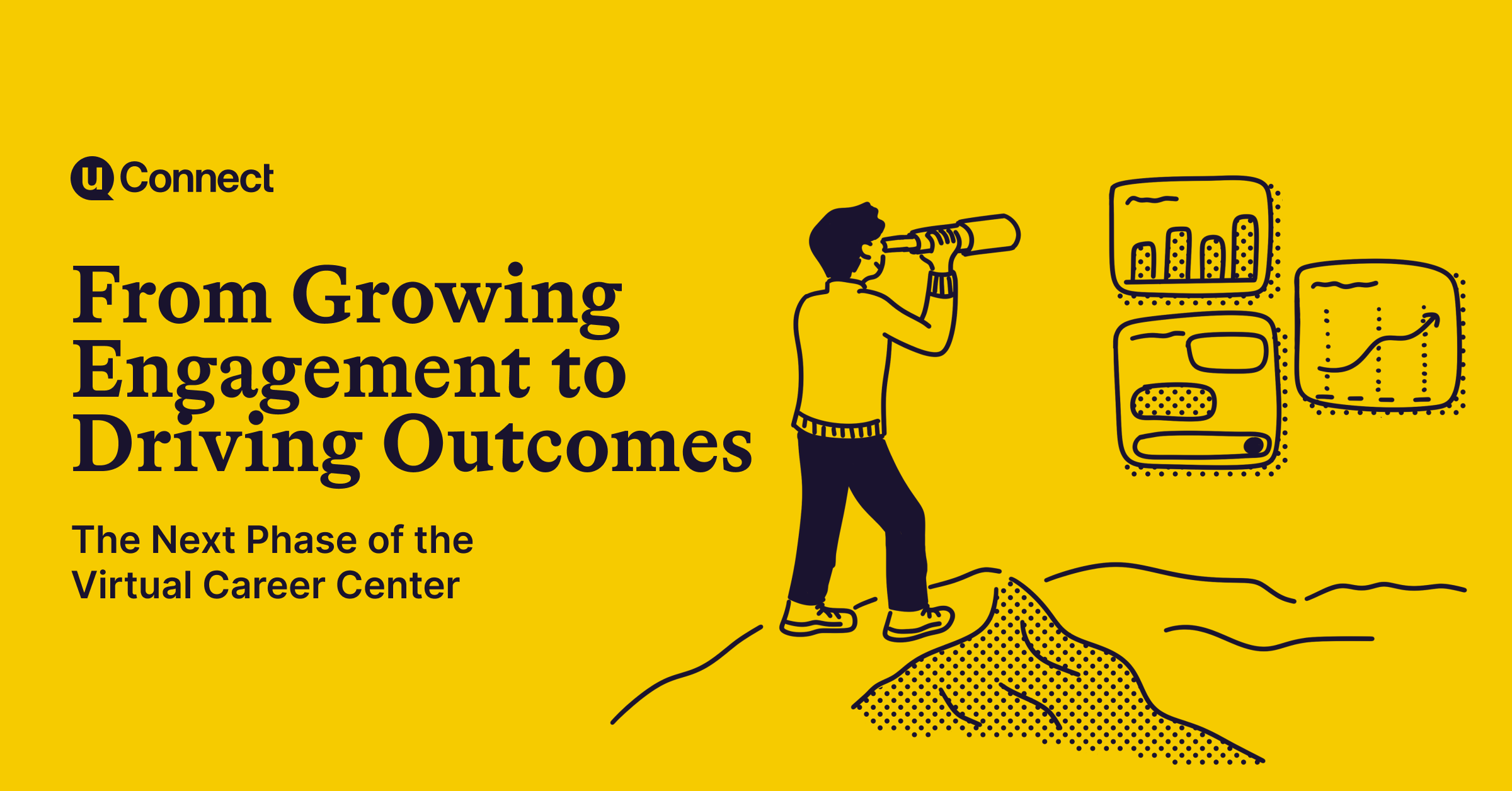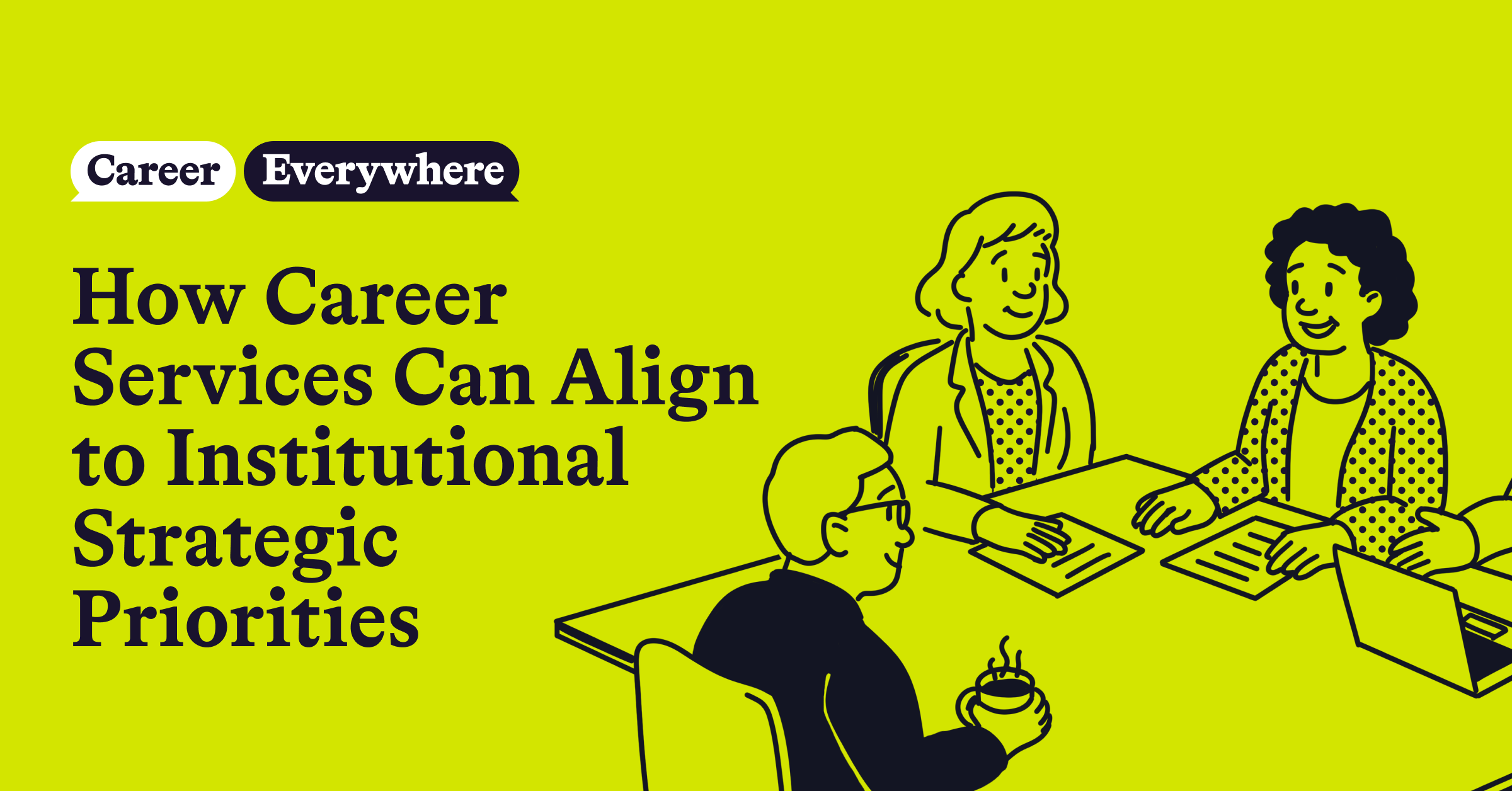
When I founded uConnect over a decade ago, the goal was to help colleges and universities meaningfully grow student engagement with career services. Today, that mission hasn’t changed, but the stakes have.
Through years of working alongside institutions, one pattern has become increasingly clear in the data: schools that consistently engage students with career resources early and often see stronger outcomes across the board. Higher persistence. Better post-graduate results. Stronger enrollment narratives.
Student engagement in career development isn’t a nice-to-have. It’s one of the most powerful levers institutions can actively influence. The next phase of uConnect is built around that conviction, helping career services teams increase engagement, measure it consistently, and understand its connection to student outcomes.
The Virtual Career Center (VCC) is evolving to put that conviction into practice through product enhancements designed to turn engagement into insight and insight into impact, without adding complexity to the day-to-day work of career services teams.
To support this evolution, we’ve made significant investments in product and engineering, expanding our team and deepening our focus on innovation, data, and scale. This work is centered on moving from engagement at scale to outcomes at scale, giving career services teams the tools and insight they need to impact student outcomes with confidence.
Here are the key areas shaping this next generation of the Virtual Career Center.
1. Increasing engagement through smarter discovery
For years, institutions have used their VCC as an agnostic entry point into the career services experience, bringing together every career resource, event, and opportunity into one central, accessible place. As more resources live within the platform, its value compounds—and seamless search and discovery become essential to helping students find the right support at the right time.
The next generation of the VCC will make career exploration easier, smarter, and more engaging for students.
Improved search capabilities, supported by AI-powered discovery, will significantly enhance how students explore content across the platform. Instead of navigating drop-down menus, students and other stakeholders will be able to ask questions or choose prompts such as “What open internships align with my major?” or “What could I expect to make once I graduate?”
The VCC will respond with curated resources, events, and opportunities drawn from the content career teams already manage in their VCC, tailored to individual interests and goals. A dynamic feed will continue to surface timely, relevant content, creating a more guided and confidence-building experience that supports engagement early and often.
As institutions add career data, this experience becomes even more powerful. Students will be able to query against real outcomes and labor market insights to explore career paths, compare options, and get clearer answers about where different choices can lead, grounded in both proven results and current market demand.
2. Tracking and understanding engagement at scale
We’ve heard your feedback on the importance of understanding engagement trends across your student population. If engagement is one of the strongest drivers of career outcomes, it’s critical for career services teams to know who is engaging, where engagement is strong or falling short, and how those patterns connect to outcomes. The next evolution of uConnect is designed to make that insight clear and actionable.
A new Engagement Score will quantify individual student activity within the platform, giving teams a comprehensive view across the student body. This makes it easier to understand how different populations engage with resources, events, and experiences, identify early indicators of success, and spot gaps where additional outreach or support may be needed.
A redesigned analytics dashboard will make engagement data seamless to explore and share, with tools to visualize trends, filter by audience, and export insights across campus. Together, these capabilities help career services move from anecdotal engagement to a clear, actionable path toward engaging every student. The dashboard will function as a practical system of record, designed not just to report on engagement, but to actively inform and guide student engagement strategies that lead to better outcomes.
3. Connecting engagement to outcomes and ROI
Engagement becomes most valuable when it can be directly linked to outcomes. uConnect is focused on closing that loop.
Engagement insights will connect to student outcomes data through a new analytics area, allowing institutions to visualize both current and historical outcomes alongside engagement trends. This makes it possible to see how career services engagement translates into indicators like job placement and early earnings, over time, not just at a single moment.
By bringing engagement and outcomes together in one place, the VCC becomes a system of record for understanding what types of engagement leads to better outcomes. Career services teams will be able to identify patterns, spot gaps earlier, and share clear, outcome-driven reports with campus leadership. These insights make it easier to demonstrate impact with confidence and position career services as a central driver of institutional success.
Built in partnership and delivered with trust
I’m proud to share that these enhancements will be available to our existing customers at no additional cost. That’s a reflection of how deeply we value the partnership and trust you’ve placed in us.
We plan to roll these capabilities out progressively over the course of 2026, beginning with foundational enhancements like AI Search and Engagement Scoring, with releases expected as soon as April. This phased approach allows us to move thoughtfully and ensure each release delivers meaningful value.
Behind the scenes, we’re also investing in the administrative experience that supports this work at scale. As engagement and analytics become more central to career services strategy, we’re continuing to make the Virtual Career Center easier and more intuitive to manage, so career teams can spend more time engaging students and acting on insights.
For those considering a partnership with uConnect—or working to gain buy-in from campus leadership—these new features, directly tied to the highest-level institutional goals, will make the ROI of implementing the Virtual Career Center platform clearer than ever.
As we build this next generation of the platform, we’re committed to doing it the right way: with transparency, security, and care. Every new feature will be developed with responsible AI practices, human-in-the-loop design, and a student-first mindset.
We take data protection very seriously. Our approach includes SOC 2 compliance, rigorous governance frameworks, and continuous monitoring to ensure that student and institutional data remain private, secure, and used only to enhance the experience of those we serve.
These enhancements represent the beginning of what’s ahead. We’ve expanded our engineering team and invested deeply in the talent and expertise that will continue driving innovation across the platform.
Career services teams are being asked to do more than ever: support students, inform strategy, and demonstrate value. These enhancements are designed to facilitate that evolution, giving career teams the tools to grow engagement, measure what matters, and show—clearly—how career services drive outcomes.
See how engagement translates to outcomes
If you’re interested in the data behind this vision, our latest white paper explores why career services engagement is one of the strongest leading indicators institutions can influence. Drawing on national outcomes data and institutional benchmarks, the report shows how institutions that prioritize scalable career engagement align more consistently with completion and early earnings outcomes.

